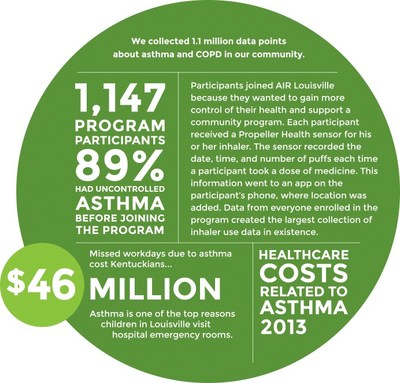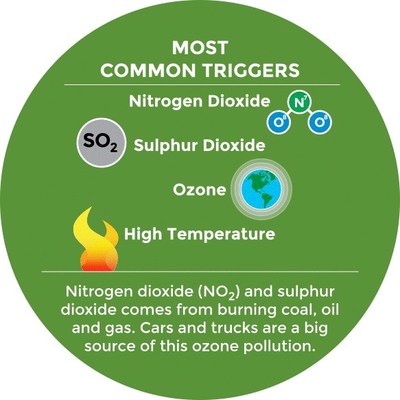Louisville Data Findings to Aid City Leaders in Reducing Burden of Asthma
Over 6.5 million data points link medication use and environmental factors; First of its kind data driven collaboration using digital health technology
LOUISVILLE, Ky., June 28, 2017 /PRNewswire/ -- Today marks the close of AIR Louisville, the first-of-its-kind data-driven collaboration among public, private and philanthropic organizations to use digital health technology to improve asthma. The program leveraged Propeller Health's FDA-cleared medication inhaler sensors which tracked when, where and how often residents of Louisville experienced asthma symptoms. These data, along with Propeller Health's personalized asthma management system, helped patients to better manage their asthma symptoms, and aided city leaders in making smarter decisions about how to keep the air clean.
Over a two-year period, the program enrolled over 1,147 participants, collected over 570 patient years of data, 251,000 medication 'puffs', and over 5.4 million environmental data points. The data were matched with environmental conditions including nitrogen dioxide, particulate matter, ozone, sulfur dioxide, pollen levels, temperature, humidity, and wind speed to identify the most significant triggers of asthma and COPD in the Louisville area.
Participants saw a 82% reduction in asthma rescue inhaler use, 29% improvement in the number of people gaining control of their asthma, twice the number of symptom-free days, and 14% increase in nights without symptoms.
The program was a collaboration between Propeller Health, Louisville Metro's Office of Civic Innovation and the Institute for Healthy Air Water and Soil. To view the full report please visit www.airlouisville.com
"A key part of Propeller's mission is to better understand patterns of respiratory disease through individual and community data," said David Van Sickle, CEO Propeller Health. "Our collaboration with AIR Louisville has provided an important opportunity to put the data we're collecting to work to help improve people's lives with asthma and COPD, to improve public health for the community of Louisville, and to move the conversation towards prevention of respiratory disease. We're excited to expand this work in other cities globally."
The AIR Louisville team created a report card that highlights the project's accomplishments, policy recommendations and next steps. See below for highlights from the report card and visit airlouisville.com to view it in full.
The project's findings identify potential gaps between federal limits on air pollution and the air quality needed to protect human health. In 2015, the ozone standard was lowered to 70 parts per billion (ppb). Analysis of the AIR Louisville data suggests that a limit of 65 ppb would be more appropriate, based on the impact this pollutant has as a trigger for asthma. Analysis of these data shows that asthma attacks and healthcare costs both increase when pollution levels reach even moderately unhealthy levels.
"The health of our residents is critical to the overall health of our community, and Louisville's location within the Ohio River Valley provides particular challenges for residents with asthma," Mayor Greg Fischer said. "Data and research show that asthma can become more severe on days of extreme heat and poor air quality. As the city and our many partners, including AIR Louisville, work to plant trees, improve air quality and #cool502, I look forward to seeing asthma sufferers enjoy cleaner air and easier breathing."
More than 12 organizations participated in AIR Louisville, including: the Louisville Metro Department of Public Health and Wellness, Air Pollution Control District, local employer partners such as Brown-Forman, Humana, Papa Johns, WHAS-11, Seven Counties Services, Kindred Healthcare, JenCare Neighborhood Medical Centers, local health plans such as Passport Health Plan, and local asthma specialty clinics like Family Allergy & Asthma and the University of Louisville.
AIR Louisville was funded by a grant from the Robert Wood Johnson Foundation, and received additional financial support from the Midland States chapter of the American Lung Association.
SOURCE Propeller Health
Related Links
WANT YOUR COMPANY'S NEWS FEATURED ON PRNEWSWIRE.COM?
Newsrooms &
Influencers
Digital Media
Outlets
Journalists
Opted In



Share this article